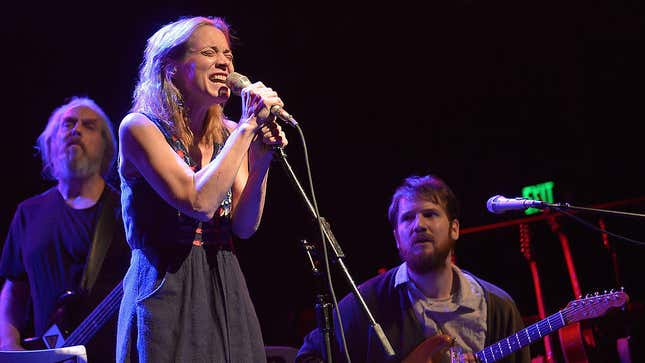Fiona Apple Just Wanted to Be Understood
Entertainment

It’s finally here: Fiona Apple’s first album in eight years, Fetch the Bolt Cutters. The album is a raw excavation of feelings and frustrations Apple has been working through across her life, delving into middle school anxieties and the weight of making art in the public eye. The scope of the work and the messy, twisting layers of confrontation Apple directs at toxic male behavior and at herself can be staggering, but it’s also a project defined by Apple’s resilience.
In conjunction with its release, Vulture ran an expansive, intimate interview between Apple and reporter Rachel Handler (who, full disclosure, is also a friend of mine), full of nuggets of searing wisdom and reflection.
Apple talks about finally getting to control the process of making her album:
“Making my first album, [I would go to the studio] from 1 p.m. to 9 p.m. every day. While everybody else put together the arrangements, [I was] just sitting there being like, ‘When do I sing? When do I sing?’ The difference between [then and now], me being like, ‘Oh, I think I’d like to play that thing on this. Okay, I can go do that right now.’ It makes me feel like I wasn’t ever given a chance to be a musician before. Because you’d have to do everything in the studio, and I’m not good at doing things in front of people under pressure.”
She also recalled being cast as “the other woman” in relationships and feeling bad about it, in retrospect:
“One thing I think I didn’t look at enough, when it comes to myself, is why I ever participated in a flirtation or even started a physical relationship with someone, when I knew they had a girlfriend. I think about it now, and both times I was privately in awe of the other woman — so was I trying to somehow put myself in the same category with her? Was I intimidated by them and I used the easiest avenue to assert my equal worth? Was I really asserting that I am only worth being a secret or that I believed deep down that it is somehow more exciting to be a secret? In both cases, I felt a boost in my ego at first. But I’ve never stopped being disgusted by the memories, and I wonder if that’s because I never apologized to the women.”
And she talked about the allegations against her ex-boyfriend Louis C.K., his public reactions, and the behavior he’s essentially perpetuating among men:
“I know he’s got such a great brain and he understands why he did that shit. I feel robbed that he’s not giving us what he thinks about that. And the fact that he’s complaining about the money he lost, and that tired joke of, ‘Hey, how’s everybody’s 2020? Did everybody have a great year?’ That was a bad joke when it was done the first time, but it’s not even a joke. The one thing I will say about that situation is that the women he harassed continue to be harassed by his little bros. By the little Louis bros. Fuck you, Louis bros. And fuck him for not even just acknowledging that. And for the record, he didn’t apologize.”
Ever since she resurfaced, Apple has emphasized the importance of wrestling back her narrative, which, she tells Vulture, was too often defined by scores of male interviewers and critics who objectified and minimized her artistry. “It’s not so important to me what happens because of this album, it is important to me the way I handle how I’m presented,” she says. “In the past, so much stuff would happen that just wasn’t me. Which is excruciating, if the whole reason you were doing anything was to be understood in the first place, you know?”
You can read the full interview here.